Location, funding, skills: Is this country Europe's best-kept secret for startups?


High-level competitions such as the Pioneers Festival have boosted Vienna's reputation and exposure in tech circles.
File it under: Underrated startup ecosystems in Europe. Admittedly, 'underrated' is not how you'd normally describe Austria in general and much less Vienna, the former capital of a huge empire and always near the top of quality-of-life rankings.
But when it comes to innovation, the country generally seems to be operating beneath the radar.
With the notable exception of Runtastic, sold last year to Adidas for $240m, few Austrian startups so far have reached international recognition.
A shortlist would probably include Shpock, a flea-market app acquired in 2015 by Norwegian media group Schibsted Austro-American high-precision optics developer Crystalline Mirror Solutions, cloud-based digital video transcoding service Bitmovin, plus a few others.
Not too bad, but not overly exciting either, especially when considering the potential of one of the richest countries in the world, in terms of GDP.
Blame it perhaps on the location? What many consider its point of strength, being a central European hub, also means having to face competition from powerful neighbors like Berlin, which steal the limelight and attract talent.
Or ascribe it to the easy going, easy living lifestyle. Although a solid welfare state, good wages and low prices do not necessarily represent the best stimulus for entrepreneurship.
But things are quickly changing, for better or worse. Unemployment in the country reached a new record high last August. Although it still remains low compared with other European nations, it could be pushing young people to look for alternative career paths.
At the same time, high-level competitions such as the Pioneers Festival have boosted Vienna's reputation and exposure in tech circles, and the government itself has gone to new lengths to promote entrepreneurship in the country.
After the implementation of the so-called 'land of founders' strategy last year, in 2016 the cabinet passed a $204m package of measures and incentives designed to make launching a startup easier, providing capital and cutting bureaucratic tolls.
"In the past five to 10 years, there was really, really significant movement in the ecosystem," one of the partners of Vienna-based Speedinvest venture-capital fund, Marie-Hélène Ametsreiter says.
"It was due to three main pillars. The first is Pioneers. The second is that we have a quite organized system for grants, based on two organizations, AWS and FFG. For a state-owned organization, they're quite flexible and market- and customer-orientated, which helped a lot of Austrian startups take their very first steps."
The Austria Wirtschaftsservice (AWS) and the Austrian Research Promotion Agency (FFG) in fact offer several opportunities for aspiring entrepreneurs: from pre-seed funding for the establishment of a high-tech company, to equity capital for the growth of young startups with high potential.
A comprehensive list of all public grants available can be found on the website of non-profit association Austrian Startups, which also organizes meetups, or Stammtische, maps local influencers and acts in general as a hub for everything entrepreneurship-related.
"Right now we have 365 members, more than 17,000 Facebook fans, and over 4,000 subscribers to our newsletter. Our biggest meetup, in Vienna, gathers 250 participants each month," Austrian Startups' managing director Cristoph Jeschke tells ZDNet.
Beyond Pioneers and public grants, the third pillar of the Austrian ecosystem renaissance in Ametsreiter's view is the development on the investments side.
Part of it is fuelled by the contribution of well-known business angels like Hansi Hansmann, a former Spain-based entrepreneur who after selling his own pharmaceutical company, went back to his native Austria and started investing in startups.
Hansmann is also one of the founders of the Austrian Angel Investors Association, active in providing seed and early stage funding. Other key players of the national startup scene include the i5invest private accelerator and the government-funded INITS business incubator.
Given the extent of public grants and private support, funding for startups in Austria might not seem an issue. But this is actually true only for early-stage companies.
"If you want to start up your business, here in Austria you can get up to €500,000 [$546,000]. Above that, it's a little bit tricky," Jeschke says.
There's only one major VC firm, Speedinvest, which last year raised €90m ($98m) in funding and can support startups up to Series A rounds. But even in this case, the average ticket size is around €500,000. Not much for startups willing to scale internationally. What is perhaps more interesting, for founders, is its firm hands-on approach.
"We believe that the conventional venture capital model is not working well and will not perform well in the future. That's why besides capital investment, we always invest also our work, meaning that we team up with founders and support them with our expertise," Ametsreiter says.
Most of startup-related activities in Austria, take place in Vienna. Other smaller hubs are Linz where Runtastic was born, Graz, home to the Startup300 accelerator, and Innsbruck, where the Skinnovation conference takes place.
The next few years will be fundamental to see if Austria can really establish itself as an international startup hub.
"We're really now at a tipping point where the efforts of the last five or six years are starting to pay off," Austrian-born Product Hunt's CTO Andreas Klinger tells ZDNet.
Klinger now lives in California but was deeply involved in the initial phases of the Austrian ecosystem growth and has kept strong ties with his home country.
As both an internal and external observer, he has a privileged observation point on the situation. "The challenge we have now is to be more effective as a country than other Eastern European places like Budapest or Sofia, which also enjoy strong support from their governments," he says.
A possible way to achieve this, could be focusing on a specific sector.
"Like Dublin, for example, which established itself as the place to go for offering customer-care services in Europe, we could try to do something similar for Eastern Europe in fields such as AI engineering or biotech, for which we have very strong universities in both cases," Klinger says.
In an increasingly competitive and multifaceted world, instead of aspiring at being the next 'silicon' something, positioning oneself as the leading player in a certain niche, might make more sense.
Read more from the Central European Processing blog
- Google, NASA? Why tech giants are turning to remote-working eastern European devs
- If Allegro is up for sale, who's in the bidding for Poland's largest auction site?
- How this small wearable could help doctors spot Parkinson's earlier
- Romanian spies want to spot faces in a crowd - illegally, say human rights groups